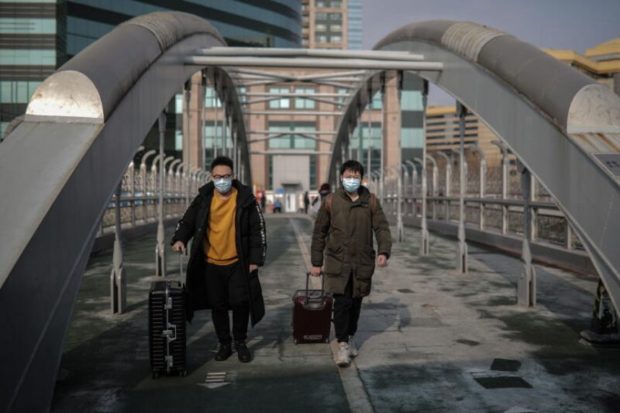For some 300 million Chinese, reunions in their hometown is not an option this Chinese New Year

The resurgence of coronavirus cases in China has lead to strict domestic travel restrictions. EPA-EFE via The Straits Times/Asia News Network
BEIJING — For the first time since he started working in Beijing three years ago, Mr Lu Yi, 21, will not be going home to Hunan for Chinese New Year.
Like millions across China, the salon assistant’s travel plans have been scuppered by a resurgence of coronavirus cases in the country this winter, leading to strict domestic travel restrictions and even companies offering incentives for employees to work through the holidays.
Most of the new cases were initially confined to several northern provinces. Still, health authorities were concerned that travel during the Spring Festival could lead to an uncontrolled spread across the country as hundreds of millions return home for what is considered the most important holiday in the Chinese calendar, where an emphasis is placed on family reunions.
The National Health Commission on Sunday (Jan 24) reported 80 new coronavirus infections, bringing the total active infections to 1,800. There were also 92 new asymptomatic cases which are tallied separately.
Peak travel season, also known as “chunyun”, begins on Jan 28 and will run until March 8. In what is often called the world’s largest annual human migration, hundreds of millions of Chinese either travel home during the extended holiday, or to take vacations abroad.
Article continues after this advertisementTransport officials are already predicting a 40 per cent decrease in travelers from the same period in 2019 – which still translates to about 407 million trips.
Article continues after this advertisementLast year’s season fell right in the middle of the height of the coronavirus outbreak, forcing millions to either delay travel or stay in their hometowns because of government-ordered lockdowns.
After a spike in coronavirus infections that started in late December 2020 – many local transmissions in Hebei, Heilongjiang and even Beijing – the government has urged residents to “celebrate Chinese New Year in place” and avoid travel during the new year.
“Our company is giving a small bonus for those of us who have agreed to not go back to our hometowns during the new year, so a few of us colleagues are planning to use the money for a nice dinner,” Mr Lu told The Straits Times.
“Naturally, my family has been disappointed. I am too, to be honest, because everyone keeps talking about reunions but you’re alone far away.
“But they understand this is necessary because of (outbreak) situation now.”
A new wave of Covid-19 cases in provinces like Hebei and Heilongjiang has revived travel restrictions, which means that even those who choose to drive home, like entrepreneur Qiu Jihong, cannot do so this year.
The Heilongjiang native said he usually makes the 1,700km road trip with his family each year, stopping over for a night in either provincial capital Harbin or neighboring Jilin province.
Hotels and guesthouses in both provinces are now wary of taking guests from Beijing, however, after a spike in local transmissions, said the 58-year-old.
“Even if we wanted to drive back, the Beijing government is now discouraging people from leaving, which makes me worry whether or not I’ll be able to come back after my visit.
“And with so many active cases in the northeast (of China), we’re also worried about the transmission risk.”
Health authorities on Wednesday (Jan 20) also announced that those wanting to return home during the upcoming holidays will have to present to local authorities with all-clear results from a nucleic acid test taken within seven days.
Those entering rural villages will also have to go through a 14-day isolation period, where they are highly discouraged from socializing or gathering in crowds.
But for some, the opportunity to spend time with family will be worth it.
Private Chinese teacher Lily Wang, who usually conducts virtual classes for foreigners all over China, will go home to Yibin in southwestern Sichuan province on Wednesday (Jan 27).
“It was a mad rush for everything, not just for air tickets but also to try and book a nucleic acid testing slot,” she said. Miss Wang, 28, said her travel date leaves her enough time to self-isolate for 14 days in her family’s rural home before meeting her relatives.
“Yes there are a lot of inconveniences but ultimately, this is the most important festival of the year and reunions mean a lot, so it’ll all be worth it,” she said.
For more news about the novel coronavirus click here.
What you need to know about Coronavirus.
For more information on COVID-19, call the DOH Hotline: (02) 86517800 local 1149/1150.
The Inquirer Foundation supports our healthcare frontliners and is still accepting cash donations to be deposited at Banco de Oro (BDO) current account #007960018860 or donate through PayMaya using this link.